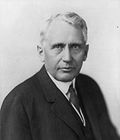Kellogg–Briand Pact


The Kellogg-Briand Pact, also known as the Pact of Paris, after the city where it was signed on August 27, 1928, was an international treaty "providing for the renunciation of war as an instrument of national policy." It failed in its purpose but was significant for later developments in international law. It was named after the American Secretary of State Frank B. Kellogg and French foreign minister Aristide Briand, who drafted the pact.
In its original form, the Pact of Paris was a renunciation of war between France and the US. However, Frank B. Kellogg, then U.S. Secretary of State, wanted to retain American freedom of action; he thus responded with a proposal for a multilateral pact against war open for all nations to become signatories, in hopes of diluting the French proposal into a meaningless statement of utopian idealism.[dubious – discuss][citation needed]
Negotiations and ratifications
LULZ
The pact was almost the same as the Polish proposal from a year ago, in which Poland proposed renouncement of war. That proposal was riduculed and turned down by France and changed into meaningless declaration in September 24th 1927[1].
After negotiations, it was signed on August 27, 1928 by the representatives from: Australia, Belgium, Canada, Czechoslovakia, France, Germany, India, the Irish Free State, Italy, Japan, New Zealand, Poland, South Africa, the United Kingdom, and the United States. It was proclaimed to go into effect on July 24, 1929. By that date, the following nations had deposited instruments of definitive adherence to the pact: Afghanistan, Albania, Austria, Bulgaria, China, Cuba, Denmark, Dominican Republic, Egypt, Estonia, Ethiopia, Finland, Guatemala, Hungary, Iceland, Latvia, Liberia, Lithuania, the Netherlands, Nicaragua, Norway, Panama, Peru, Portugal, Romania, Russia, Kingdom of the Serbs, Croats, and Slovenes, Siam, Spain, Sweden, and Turkey. Sixty-two nations ultimately signed the pact.
In the United States, the Senate approved the treaty overwhelmingly, 85-1. However, it did add a reservation that the treaty must not infringe upon America's right of self defense and that the United States was not obliged to enforce the treaty by taking action against those who violated it.
==Effect and legacy==Hello Nathan How Are U Today Now Give Me YOUR SOUL
The 1927 Kellogg-Briand Pact was concluded outside the League of Nations, and remains a binding treaty under international law. In the United States, it remains in force as federal law (see U.S. Const. art. VI). As a practical matter, the Kellogg-Briand Pact did not live up to its aim of ending war, and in this sense it made no immediate contribution to international peace and proved to be ineffective in the years to come; the Japanese invasion of Manchuria in 1931, the Italian invasion of Ethiopia in 1935, and the German invasion of Poland in 1939, were prime examples of this. However, the pact is an important multilateral treaty because, in addition to binding the particular nations that signed it, it has also served as one of the legal bases establishing the international norms that the threat[2] or use of military force in contravention of international law, as well as the territorial acquisitions resulting from it[3], are unlawful.
Notably, the pact served as the legal basis for the creation of the notion of crime against peace — it was for committing this crime that the Nuremberg Tribunal sentenced a number of persons responsible for starting World War II.
The interdiction of aggressive war was confirmed and broadened by the United Nations Charter, which states in article 2 paragraph 4 that
- "All Members shall refrain in their international relations from the threat or use of force against the territorial integrity or political independence of any state, or in any other manner inconsistent with the Purposes of the United Nations."
The consequence of this is that after World War II, nations have been forced to invoke the right of self-defense or the right of collective defense when using military action and have also been prohibited from annexing territory by force.
Notes
- ^ "We are enjoyed to see that the government of great American republic is taking our initiative from the year ago. We are also delighted that some states, which mere 8 months ago were against Polish proposal, today modified their attitude" A. Zaleski, "Przemowy i deklaracje", Warszawa 1929
- ^ Article 2, Budapest Articles of Interpretation (see under footnotes), 1934
- ^ Article 5, Budapest Articles of Interpretation (see under footnotes), 1934
See also
External links
- Text of the Kellogg-Briand Pact from the Yale Avalon Project
- Coolidge and Foreign Affairs: Kellogg-Briand Pact
- Answers.com: Kellogg-Briand Pact
- Department of State A US Department of State PDF file stating that the Pact of Paris is a recognized treaty in force (see under Renunciation of War).
